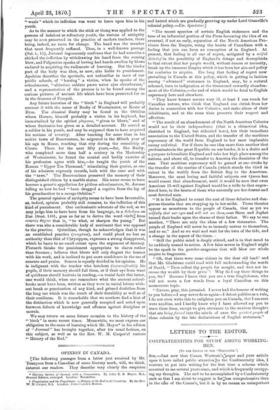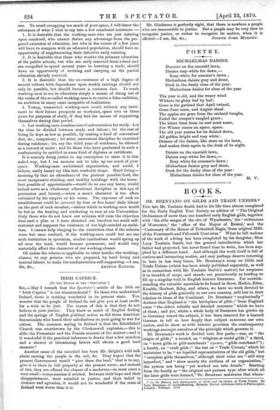LETTERS TO THE EDITOR.
CONFRATERNITIES FOR STUDY AMONG WORKING- MEN.
[TO 11111 EDITOR OF THE "SPECTATOR:1 Sm,—Just now that Canon Weatcott's:paper and your article upon it have called public attention to the Confraternity idea, I venture to put into writing for the first time a scheme which occurred to me several years since, and which is frequently occupy- ing my thoughts. The end to be accomplished by a Confraternity such as that I am about to suggest is far:less comprehensive than in the cftse of the Canon's, but it is by no means an unimportant
one. To avoid occupying too much of your space, I will throw the substance of what I wish to say into a few numbered sentences :— 1. It is desirable that the working-men who are just entering upon manhood, who cannot derive any advantage from the pro- posed extension of education, but who in the course of a few years will have to compete with an educated population, should have an opportunity of supplementing their defective early training.
2. It is desirable that those who receive the primary education of the public schools, but who are early removed from school and are compelled to spend several years in learning a trade, should have an opportunity of reviving and carrying on the partial education already received.
3. It is desirable that the co-existence of a high degree of mental culture with dependence upon weekly earnings should not only be possible, but should become a common fact. To teach working-men to see in education simply a means of rising out of the ranks of the so-called working-men is to excite a false ambition, an ambition in many cases incapable of realization.
4. Young, unmarried working-men could, without any detri- ment to their future prospects as workmen, spare two or three years for purposes of study, if they had the means of supporting themselves during that period.
5. Let working-men combine into Confraternities for study. Let the time be divided between study and labour ; let the cost of living be kept as low as possible, by making a kind of conventual diet, &c., compulsory ; let strict conventual discipline be exercised during residence; let, say the third year of residence, be allowed as a reward of merit ; and let those who have graduated in such a confraternity be entitled to some kind of diploma or certificate.
It is scarcely doing justice to my conception to state it in this naked way, but I am anxious not to take up too much of your space. Working-men understand organization, and could, I believe, easily knead my idea into workable shape. Hard living— meaning by that an abundance of the plainest possible food, the most inexpensive clothing, and healthy buildings with the home- liest possible of appointments—would do no one any harm, would indeed serve as a wholesome educational discipline in this age of pretension and luxury,—when a man's character is too often estimated by his carpets or his wines. The expenses of such an establishment could be covered by four or five hours' daily labour on the part of each member,—labour which to working-men would be but as the boating and ericketing to men at our Universities. Only those who do not know our salaams will raise the objection that such a plan as I have sketched out involves too much self- restraint and supposes the existence of too high-minded an ambi- tion. I cannot help clinging to the conviction that if the scheme were but once realized, if the working-men could but see one such institution in operation, similar institutions would spring up all over the land, would become permanent, and would very materially affect the character of our working-classes.
Of course the scheme is applicable to other besides the working- classes, to any persons who are prepared, by hard living and manual labour, to make the confraternities self-supporting.—! am,































 Previous page
Previous page